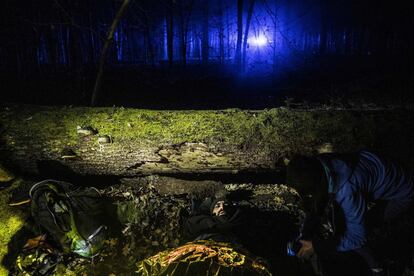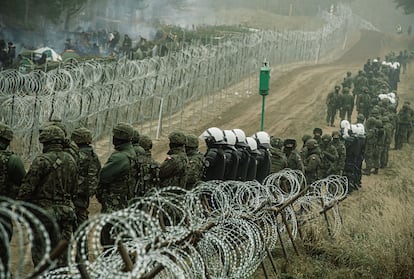The EU enters 2022 surrounded by that old European demon that is immigration, capable of turning the institutions of Brussels upside down. The recent crisis on the eastern border with Belarus seems almost extinct, but the influx of thousands of people promoted by the Aleksandr Lukashenko regime has stirred waters that had not yet calmed since the 2015 refugee crisis. For the first time, the The EU has begun to treat migratory flows as a security and defense problem, even relegating the protection of the right to asylum, a hardening that seems destined to continue during 2022. The emergency due to the action of Minsk, which began in summer and reached a Peak in November, has caused the European Commission to raise the political tone, which did not hesitate to describe the events as a “hybrid attack”; This has been followed by more restrictive proposals on international protection norms when migrants are “instrumentalized” by governments around the Twenty-seven to achieve political objectives. The initiative – rejected by NGOs and a large part of the European Parliament, who consider that it violates the founding values of the EU – is a warning of Brussels’ turnaround on migration. And it promises to leave new existential consequences, with Europe sitting once more on the couch wondering about its great contradictions.
The flow of migrants and potential refugees orchestrated by Minsk on the EU’s eastern border appears to have ceased, following the Commission’s effort to curb the onslaught with a mix of bans on airlines and travel agencies involved in the artificial creation of crises. migratory along the European borders; negotiations with the governments of the countries of origin on the granting of visas; and a fifth round of sanctions against Belarus. “Certainly, things have not gone well for Lukashenko,” said the head of European diplomacy, Josep Borrell, in a meeting with journalists shortly before the Christmas holidays. “If he thought that with this pressure on our borders he was going to achieve something, he really has achieved nothing more than to create a problem for himself.”
But Lukashenko has at least caused Brussels to be on the alert for what it considers to be a new phenomenon. “Let’s call it by its name: this is a hybrid attack to destabilize Europe,” said the President of the European Commission, Ursula von der Leyen, in a September speech on the State of the EU. Originally called “hybrid warfare,” it incorporates unconventional forces such as organized influx of migrants and disinformation.
With the disaster in Afghanistan underway, after the chaotic departure from the West, and other conflicts simmering – with Ethiopia as one of the main focuses in sub-Saharan Africa – everything seems to herald months of migratory tension. Already 2021 has ended with more than 120,000 irregular entries through the Mediterranean (an increase of almost 30% compared to the previous year), according to provisional data from mid-December included in an internal report by the European Commission, to which it has had access THE COUNTRY.

On the eastern border, the figures are low, but astronomical in comparative terms: from 677 irregular entries a year ago, it has risen to more than 8,000 between Poland, Lithuania and Latvia, the three community neighbors of Belarus, where there have also soared Asylum applications: up to 181% more in Poland, multiplying by 10 in Lithuania and by four in Latvia.
Join EL PAÍS to follow all the news and read without limits.
Subscribe
The Community Executive responded in December with two proposals to toughen asylum measures in the face of situations of “instrumentalization of migrants” by third countries with the “intention of destabilizing” the EU and the potential to “endanger essential functions” of a State member. The first of the initiatives, put on the table on December 1, aims to authorize in an exceptional and limited way a harsh treatment with refugees arriving in Poland, Lithuania and Latvia. This measure, which still needs to be approved by the EU Council (the body where the 27 governments sit), includes keeping asylum seekers at the border, extending the processing of applications up to four months and returning expeditiously to those who see their request rejected. The second of the proposals – which came just two weeks later – seeks to make these extraordinary tools permanent and extend them to the entire community club.
The initiatives have drawn the ire of NGOs and MEPs. The European Council of Refugees and Exiles (ECRE, for its acronym in English) has reacted with a report in which it warns of its “adverse effect”, since they could undermine a long list of fundamental values that go from the right to human dignity to the rights of the child. “De facto it is a suspension of the right of asylum ”, denounces the MEP Sira Rego, candidate of the left group to preside over the European Parliament in the second half of the legislature. The Spanish woman also regrets how “the people who come from Afghanistan and conflict zones have been dehumanized.” “They are people seeking refuge, who have lived through situations of savage violence, and have been objectified. It is atrocious ”.
The Lukashenko regime’s ploy, in the opinion of Camino Mortera-Martínez, an analyst at the Center for European Reform, “has failed mainly due to the lack of support from Russia, but if what is wanted in Europe are these measures by the Commission and also the exceptions to the immigration and asylum rules, it can be said that it has had a certain result ”. The proposals somehow cover the harsh response of the ultranationalist government of Poland, which has shielded the border with thousands of police and military and prohibited access to uncomfortable witnesses. Even the United Nations High Commissioner for Human Rights denounced that Warsaw had denied him access to the area, but managed to document hot returns of people who had requested international protection, including children.
Brussels is heading, decision after decision, towards a tight control of the Community borders. The European agency Frontex, which plans to add 10,000 agents compared to the current thousand, broke records of returns of immigrants in an irregular situation in the first half of the year. Forced and voluntary returns thus become one of the pillars of the new migration plan, consisting of limiting the stay on community soil exclusively to those who have the right to asylum and accelerating the expulsions of the rest of the migrants arriving in Europe.
Rego believes that not all the fault lies with Minsk, no matter how much one does not like what is happening in that country. “Belarus would not have instruments against the EU if we had another type of migration policy,” he argues. This is: one that facilitates legal entry ways and does not accumulate thousands of people on the other side of a “wall” waiting to risk their lives to enter. “The EU gives the key to these gentlemen in command of authoritarian governments,” adds Rego, recalling what happened with Turkey during the 2015 refugee crisis, when the EU was forced to formalize an agreement with Ankara of 6,000 million euros to to stop migrants; or the closest episode with Morocco. The Ceuta crisis, which kept Spain in suspense in May with the entry of 10,000 people from Morocco, reflects how geopolitics and humanitarian crises have intersected to take on a new meaning: the episode took place after a diplomatic disagreement, when Spain welcomed the leader of the Polisario Front, Brahim Gali, to treat him for covid in a hospital in Logroño.

HANDOUT (Europa Press)
A long tradition
The political use of migrants is not a new phenomenon. There is a long tradition of coercion for political gain, argues scholar Kelly M. Greenhill, author of the book Weapons of mass migration (Weapons of mass migration). This teacher has identified dozens of cases since 1951 – when the Geneva Convention on the Status of Refugees came into force – ranging from the exodus of Mariel from Cuba to the United States (in 1980) to the claim of 5,000 million euros from Europe by of the Libyan dictator Muammar Gaddafi, in 2010, to prevent the EU from becoming “a new black continent”.
“European countries have always been subject to this kind of coercion,” Greenhill notes via email. “But while the United States was the most popular target during the 1990s, the EU countries have been much more popular in the last decade. This is so, in part, due to the explosion of involuntary displaced persons as a consequence of the wars in Afghanistan, Iraq, Libya, Syria, etc ”.
The academic is not clear that what happened on the border with Belarus is a case of political coercion. “It could simply be a type of migration designed to inconvenience, embarrass or destabilize the EU, and not to extract political, military or economic concessions,” he explains. Greenhill believes that responding by tightening policies against immigrants and asylum seekers may allow an escape from pressure in the short term, “but at great potential cost in the long term, as well as greater vulnerability to this type of coercion in the future.” “Policy tightening often does nothing more than delay problems,” he concludes. “And when they reappear, they tend to be even bigger than they were at the beginning.”
Nor does he have an answer on how to act: compromising with political demands, he says, may imply “an escalation of demands in the future.” And remember that, on occasions, those who exerted pressure did achieve their objectives. “Some of the most successful, however, paid a huge price for overusing it.” And he gives Gaddafi as an example: the satrap ended up dead after the arab springs 2011 and the military intervention of NATO.
In the EU, the so-called Strategic Compass, a still confidential document prepared by Borrell’s department, aims to provide the community club with geopolitical orientation. “We are facing a dangerous mix of armed aggression, illegal annexations, fragile states, revisionist powers and authoritarian regimes,” says the document, to which EL PAÍS has had access. A “breeding ground for multiple threats to European security,” he adds. Among which includes irregular migration, a classification that reflects the way it is treated.
“The world has become more hostile towards Europe”
Marija Golubeva, Latvia’s Interior Minister, believes that it is not Europe that has hardened its response. It is the world out there that has changed. “There has been a general retreat towards authoritarianism,” he says in an interview in Brussels in December with EL PAÍS. After the crisis with Belarus, his country began to raise a separation fence and has demanded that the Commission pay it (something it has refused to do) and also greater flexibility in the application of asylum rules (something that is on going).
“Unfortunately, not all situations are conducive to us fully exercising all asylum procedures, which we would exercise under normal circumstances,” says Golubeva. “We have to be more, how to say it? We have to balance our commitments with the real world out there, which is becoming more hostile towards Europe every day ”. The Latvian minister assures that respecting the full asylum procedure in situations such as the one experienced would immediately cause Belarus to try to organize an even larger group of migrants. “It is a very conscious attempt to exploit our international commitment and the ethos European humanitarian ”, sentence.
Follow all the international information at Facebook Y Twitter, o en our weekly newsletter.
elpais.com
Eddie is an Australian news reporter with over 9 years in the industry and has published on Forbes and tech crunch.